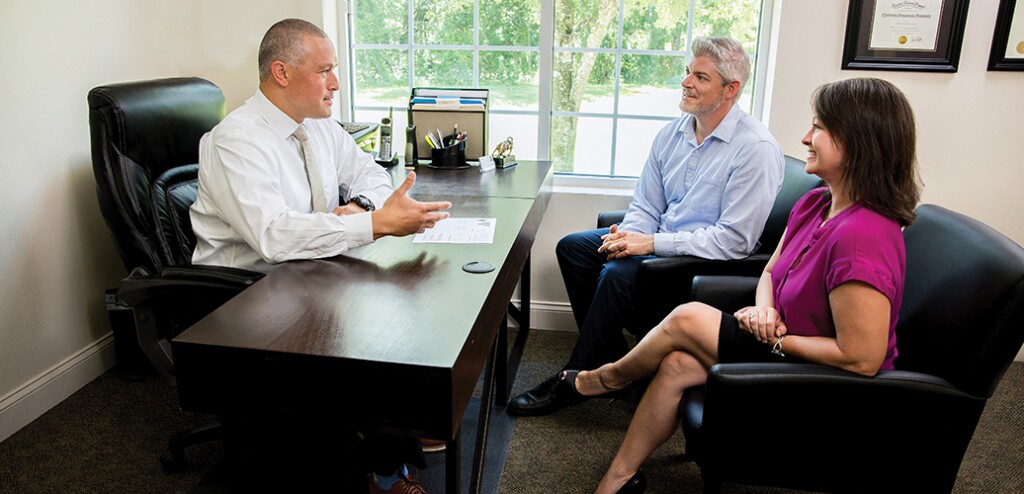When you choose to work with a financial advisor, finding someone who's knowledgeable about managing your money is certainly a prerequisite. So, it's tempting to look at a professional's credentials and years of experience as a quick way to size them up.
However, expertise is just one part of the puzzle. When you select a financial advisor, you also want someone who understands your values and puts those first. That's why it's important to get to know them upfront. Here are some questions to ask a financial advisor before you start working with them.
1. Why have you chosen to be a financial advisor with Thrivent?
The way an advisor tells their career story can offer insight on them and the company they represent.
Maybe they were drawn to the organization’s mission and how they help the clients and communities they serve. Or perhaps they’re excited about giving financial advice and guidance that goes beyond recommending products. There are many reasons why an advisor might choose to work with one company or another. Ideally, their answer will demonstrate a thoughtful, sincere commitment to their work and the clients they serve.
2. How have you set expectations with clients around returns and market volatility?
Predicting market cycles is best left to fortune-tellers. What a financial advisor can do, however, is help you develop an allocation that supports your values and financial goals, including
Listen for a response that is both realistic and reassuring. A skilled advisor should be responsive to their clients’ concerns, keep the clients’ portfolio aligned to their risk tolerance, and offer ongoing education and communication.
3. How would you assess whether my financial plan is on track?
Keeping your plan on track means regularly checking in with you and staying up to date on important events in your life. Your advisor likely will recommend a cadence for meeting to review your progress.
A financial advisor also should be able to summarize steps they take between meetings with clients and ways they help clients stay on track, regardless of how Wall Street is doing. Did they steer a client toward a more tax-efficient investment account? Did they help someone create a budget to increase retirement contributions? You'll want to get the sense that they have a concrete, tested approach.
If your financial advisor also is entrusted to managing your investments, they should be able to explain how they define success. Given the unpredictable nature of the markets, be wary of anyone who promises you a specific rate of return. However, they may use another benchmark, such as comparing the net return of a client’s investments to a relevant
4. How do you respond when a client asks you to do something that's not in their best interest?
Even the best financial advisors can experience pushback from clients about aspects of the financial plan. Whether it’s choosing new investments, hearing about an enticing financial strategy or making a large purchase not reflected in the plan, a good financial advisor will offer thoughtful guidance while honoring your autonomy.
You’re ultimately in control of the final decision, but you should find reassurance that a financial advisor can explain potential pitfalls of choosing a different approach than the one they recommend. If they can't tell you about a time they've stepped in to educate a client, it may be a sign that they're not fully invested in their clients' success.
5. Which lessons learned in your career have shifted your perspective or changed how you advise clients?
If you're wondering how to interview a financial advisor, think of it like you're vetting a job applicant. This question accomplishes a few things: It shows whether the advisor is open to professional growth and learning new information. It also tells you what perspective they hold today.
Pay attention to how the advisor describes their role and client relationships. Advice isn’t the same as instruction or telling someone what to do; a good advisor listens closely to clients and seeks to build trusting partnerships.
6. What would your clients say about you? Is there a type of client you prefer?
Essentially, you're looking for the person to describe their best professional attributes. Many financial advisors can rattle off a few nice characteristics, but which ones they choose to highlight can tell you about their priorities. You also can get a sense of their sincerity if they can tell you why clients would describe them in that way.
Asking them about their client preferences can give you another chance to find out what qualities stand out to them. You can gauge their descriptions and consider how well it matches the way you see yourself in this potential relationship.
7. How do you typically work with clients?
The last thing you want is to have a great first meeting with your financial advisor only to wonder when, or if, you'll hear from them again. Be sure you come away with a solid understanding of what to expect in the near future. Is there a preference for in person, virtual or phone meetings? How often will you meet throughout the year?
In addition to having a consistent approach to client meetings, the advisor should demonstrate a flexible, open communication style. Are they open to informal check-ins and quick questions between scheduled meetings?
Find a financial advisor near you
When it comes to reaching your major life goals, designing







